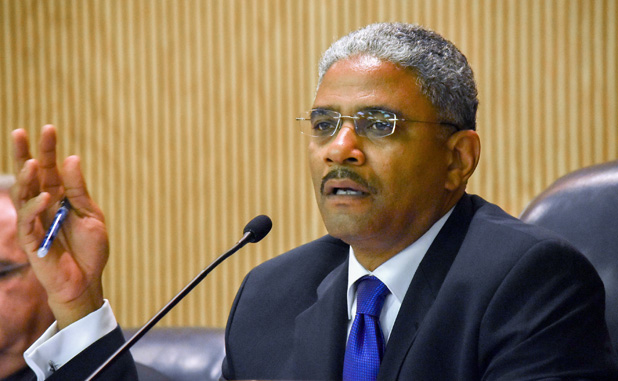Fayette GOP loses suit against county; commission sues for $57K
The Fayette County Board of Commissioners — comprising a 4-to-1 Republican majority — is dunning the Fayette Republican Party for $57,712.
The majority of three Republicans and one Democrat voted at the board’s Feb. 11 regular meeting to seek attorneys’ fees from the lawsuit filed by the county’s Republican Party against former Election Board Chairman Marilyn Watts, a former Republican Party official herself.
County Attorney Dennis Davenport advised the board at its previous meeting that, since Watts prevailed in the lawsuit for which the county paid the legal bills, the commissioners had the option of requesting the financial relief although there was no guarantee they would get it.
The deadline to formally request this was Feb. 15, Davenport said, which was the end of a 45-day window allowed for such an action.
“You might not get [the funds], but you certainly won’t if you don’t ask,” he said.
The board voted about three years ago to back Watts’ defense in an action filed by the Fayette County Republican Party and Scott Fabricius as its then-chairman and individually, according to Davenport.
The decision was made because the commissioners felt Watts was acting in her official capacity on the Election Board, and she agreed at the time to pay back her legal fees if the court found her to be acting outside the scope of her official responsibility. That did not happen.
Fayetteville attorney Richard Hobbs served as the lawyer for the plaintiffs. Davenport informed the board that it would have to determine officially whether to request the funds from any particular party or all three: Fabricius, Hobbs and the party. It will ultimately be up to a judge to decide if the case merits the county recouping the money.
The vote to seek the money was 4-1 with Steve Brown voting against. He objected strongly to the action, calling it “a dangerous precedent and a strategic lawsuit against public participation.”
“When the government starts suing people for raising criticism or claims of unethical behavior or whatever, you are permanently silencing the public out of fear of retribution from the government,” said Brown. [See Brown’s letter to the editor on Page A6.]
That feeling was not shared by Brown’s colleagues, with Democrat Charles Rousseau being the most vocal in pointing out that the county had defended Watts “in her capacity as an official doing her job on our behalf.”
“We are not going after anyone,” said Rousseau. “We were defending someone who was serving on a recognized board.”
Chairman Charles Oddo pointed out what he felt was the board’s responsibility to the entire county.
“We have a duty to the taxpayers to guard their money as well,” he said. “Everybody went into that with their eyes open. We have a fiduciary responsibility to the citizens to recoup that money if we can. We need to see if we can get those funds, or some of those funds, returned.”
Brown, who proclaimed that he was “probably the strongest First Amendment advocate in Fayette County” and cited his own action against Peachtree City as a private citizen that cost him $10,000 or more, said it is worth spending a little extra money to avoid “the perception that we will punish anyone for speaking out.”
Oddo countered that Brown’s argument would just as easily motivate people to file suits that may or may not be frivolous because they know the government will not do anything.
Brown made a motion for the county not to proceed and it did not get a second.
Rousseau moved to instruct the county attorney to seek compensation for the lawsuit and “recover the funds in the amount stated to return to the taxpayers of the county.” David Barlow seconded that motion.
After Davenport asked for clarification, Rousseau amended his motion to state that the funds would be sought from all parties involved, including the attorney.
“I know this will cause some criticism but I am ready to go forward and do what we need to do,” said Barlow. “If it were my money that would be one thing, but this is taxpayers’ money and it’s not a few hundred dollars. I don’t know how I could tell constituents that we didn’t care about their money.”
Barlow called it “a terrible situation” and noted that there was “genuine contentiousness in the lawsuit,” during which Watts “rightly” prevailed.
During this discussion and that of a related agenda item (see separate story in this edition), it became clear that there was no small amount of contentiousness between Brown and Watts, who was at the meeting and spoke to the board on two occasions.
One of the arguments in seeking the funds is the question of whether the lawsuit was frivolous. Brown insisted that it was not, noting that Watts’ attorneys moved to have it stopped at every possibility and it never happened — the judge sent it to trial.
Watts said that the state election board agreed the suit was indeed frivolous and the court allowed it to proceed anyway.












Leave a Comment
You must be logged in to post a comment.